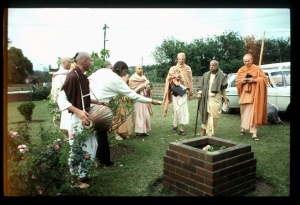SB 10.18.12: Difference between revisions
m (1 revision(s)) |
No edit summary |
||
| Line 1: | Line 1: | ||
{{info | {{info | ||
|speaker= | |speaker=Śukadeva Gosvāmī | ||
|listener=King | |listener=King Parīkṣit | ||
}} | }} | ||
[[Category:Srimad-Bhagavatam - Canto 10 Chapter 18]] | |||
[[Category:Bhagavatam Verses Spoken by Sukadeva Gosvami - Vanisource|101812]] | |||
<div style="float:left">'''[[Srimad-Bhagavatam]] - [[SB 10|Tenth Canto]] - [[SB 10.18: Lord Balarama Slays the Demon Pralamba|Chapter 18: Lord Balarāma Slays the Demon Pralamba]]'''</div> | |||
<div style="float:right">[[File:Go-previous.png|link=SB 10.18.11]] '''[[SB 10.18.11]] - [[SB 10.18.13]]''' [[File:Go-next.png|link=SB 10.18.13]]</div> | |||
{{RandomImage}} | |||
{{SBnotice}} | |||
==== TEXT 12 ==== | ==== TEXT 12 ==== | ||
<div | <div class="verse"> | ||
bhramaṇair laṅghanaiḥ kṣepair | :bhramaṇair laṅghanaiḥ kṣepair | ||
āsphoṭana-vikarṣaṇaiḥ | :āsphoṭana-vikarṣaṇaiḥ | ||
cikrīḍatur niyuddhena | :cikrīḍatur niyuddhena | ||
kāka-pakṣa-dharau kvacit | :kāka-pakṣa-dharau kvacit | ||
</div> | </div> | ||
| Line 17: | Line 22: | ||
==== SYNONYMS ==== | ==== SYNONYMS ==== | ||
<div | <div class="synonyms"> | ||
''bhramaṇaiḥ''—with whirling about; ''laṅghanaiḥ''—jumping; ''kṣepaiḥ''—throwing; ''āsphoṭana''—slapping; ''vikarṣaṇaiḥ''—and dragging; ''cikṛīḍatuḥ''—They(Kṛṣṇa and Balarāma) played; ''niyuddhena''—with fighting; ''kāka-pakṣa''—the locks of hair on the sides of Their heads; ''dharau''—holding; ''kvacit''—sometimes. | |||
</div> | </div> | ||
{{SBcollapse}} | |||
==== TRANSLATION ==== | ==== TRANSLATION ==== | ||
<div | <div class="translation"> | ||
Kṛṣṇa and Balarāma played with their cowherd boyfriends by whirling about, leaping, hurling, slapping and fighting. Sometimes Kṛṣṇa and Balarāma would pull the hair on the boys' heads. | Kṛṣṇa and Balarāma played with their cowherd boyfriends by whirling about, leaping, hurling, slapping and fighting. Sometimes Kṛṣṇa and Balarāma would pull the hair on the boys' heads. | ||
</div> | </div> | ||
| Line 31: | Line 36: | ||
==== PURPORT ==== | ==== PURPORT ==== | ||
<div | <div class="purport"> | ||
The ācāryas have explained this verse as follows: The word bhramaṇaiḥ indicates that the boys, pretending they were machines, would sometimes | The ''ācāryas'' have explained this verse as follows: The word ''bhramaṇaiḥ'' indicates that the boys, pretending they were machines, would sometimes | ||
whirl about until they became dizzy. They would also sometimes jump about (laṅghanaiḥ). The word kṣepaiḥ indicates that sometimes they would hurl objects like balls or stones and that sometimes they would grab each other by the arms and throw one another about. Āsphoṭana means that sometimes they would slap one another's shoulders or backs, and vikarṣaṇaiḥ indicates they would drag one another about in the midst of their play. By the word niyuddhena arm wrestling and other types of friendly fighting are indicated, and the word kāka-pakṣa-dharau means that Kṛṣṇa and Balarāma would sometimes grab the hair on the other boys' heads in a playful manner. | whirl about until they became dizzy. They would also sometimes jump about (''laṅghanaiḥ''). The word ''kṣepaiḥ'' indicates that sometimes they would hurl objects like balls or stones and that sometimes they would grab each other by the arms and throw one another about. ''Āsphoṭana'' means that sometimes they would slap one another's shoulders or backs, and ''vikarṣaṇaiḥ'' indicates they would drag one another about in the midst of their play. By the word ''niyuddhena'' arm wrestling and other types of friendly fighting are indicated, and the word ''kāka-pakṣa-dharau'' means that Kṛṣṇa and Balarāma would sometimes grab the hair on the other boys' heads in a playful manner. | ||
</div> | </div> | ||
__NOTOC__ | </div> | ||
</div> | |||
<div style="float:right">[[File:Go-previous.png|link=SB 10.18.11]] '''[[SB 10.18.11]] - [[SB 10.18.13]]''' [[File:Go-next.png|link=SB 10.18.13]]</div> | |||
__NOTOC__ | |||
__NOEDITSECTION__ | |||
Revision as of 08:19, 21 May 2021

A.C. Bhaktivedanta Swami Prabhupada
Please note: The synonyms, translation and purport of this verse were composed by disciples of Śrīla Prabhupāda
TEXT 12
- bhramaṇair laṅghanaiḥ kṣepair
- āsphoṭana-vikarṣaṇaiḥ
- cikrīḍatur niyuddhena
- kāka-pakṣa-dharau kvacit
SYNONYMS
bhramaṇaiḥ—with whirling about; laṅghanaiḥ—jumping; kṣepaiḥ—throwing; āsphoṭana—slapping; vikarṣaṇaiḥ—and dragging; cikṛīḍatuḥ—They(Kṛṣṇa and Balarāma) played; niyuddhena—with fighting; kāka-pakṣa—the locks of hair on the sides of Their heads; dharau—holding; kvacit—sometimes.
Translation and purport composed by disciples of Śrīla Prabhupāda
TRANSLATION
Kṛṣṇa and Balarāma played with their cowherd boyfriends by whirling about, leaping, hurling, slapping and fighting. Sometimes Kṛṣṇa and Balarāma would pull the hair on the boys' heads.
PURPORT
The ācāryas have explained this verse as follows: The word bhramaṇaiḥ indicates that the boys, pretending they were machines, would sometimes whirl about until they became dizzy. They would also sometimes jump about (laṅghanaiḥ). The word kṣepaiḥ indicates that sometimes they would hurl objects like balls or stones and that sometimes they would grab each other by the arms and throw one another about. Āsphoṭana means that sometimes they would slap one another's shoulders or backs, and vikarṣaṇaiḥ indicates they would drag one another about in the midst of their play. By the word niyuddhena arm wrestling and other types of friendly fighting are indicated, and the word kāka-pakṣa-dharau means that Kṛṣṇa and Balarāma would sometimes grab the hair on the other boys' heads in a playful manner.